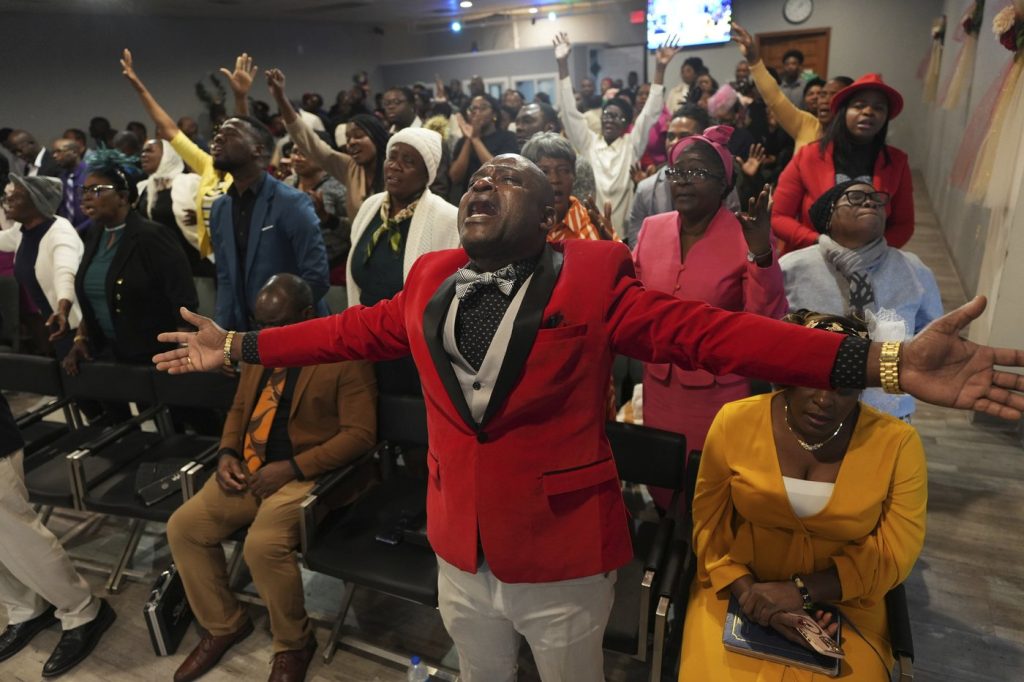SPRINGFIELD, Ohio (AP) – During a recent Sunday service, Rev. Reginald Silencieux, the pastor of the First Haitian Evangelical Church in Springfield, Ohio, knelt in prayer surrounded by ushers and musicians. This gathering occurred against a backdrop of heightened anxiety within the local Haitian community, which numbers around 15,000 residents. Many church attendees sought pastoral guidance on how to respond to potential federal immigration raids, a concern heightened by former President Donald Trump’s strict immigration policies.
Rev. Silencieux expressed his hopes for protection over his congregation, stating, "As a church, we have an obligation to pray for [Trump] because he’s our political leader right now." The anxiety in Springfield’s Haitian community stems mainly from fears of losing the Temporary Protected Status (TPS) program, which allows thousands of Haitian immigrants to reside legally in the U.S. as unrest and violence have plagued their home country.
The community leader, Viles Dorsainvil, highlighted the escalating panic among immigrants, spurred on by media reports showcasing arrests in other U.S. regions. The fear of deportation has drastically changed the daily lives of many, driving some to remain indoors and limiting their outings. Dorsainvil emphasized that most immigrants in the U.S. are hardworking individuals and deserve more understanding from the administration.
Fears intensified following Trump’s baseless accusations against Haitians in Springfield, claiming they engaged in bizarre activities involving their pets. Such rhetoric not only stoked anti-immigrant sentiments but led to threats against local institutions, including bomb threats aimed at schools and government buildings.
Another community leader, Jacob Payen, noted the shift in fears within the immigrant community. Previously, concerns revolved around potential violence from far-right groups, but now, the looming threat of deportation has taken precedence. This displacement of fear has resulted in a quieter commercial plaza as many patrons opt to stay home rather than venture out.
Brutus Joseph, a local who works in solar panel installation, articulated his distress and frustration about feeling unjustly targeted due to his nationality. His anxieties were compounded by a worry for his five children’s future in a country that he believed would be more welcoming. "My children can get raped and killed if I go back, so I have everything to lose," he expressed, appealing to Trump as a fellow family man.
Rev. Philomene Philostin, another pastor at the church, lamented the reduced attendance at services, urging the community to remain vigilant but not overly fearful. This sentiment is echoed by faith leaders across the country, where interfaith discussions aim to improve support and security for migrants, reflecting a widespread concern for immigrant rights and safety.
Throughout his administration, Trump utilized provocative language to express his views on immigration, often referring derogatorily to nations such as Haiti. His approach to illegal immigration has become a focal point of his political platform for the 2024 election, further feeding anti-immigrant sentiment.
The TPS program is set to expire in February 2026, leaving many, including Romane Pierre, who fled violence in Haiti, in a state of uncertainty. Having lost his daughter to illness when they could not reach a hospital due to gunfire in Port-Au-Prince, Pierre’s story emphasizes the dire circumstances many Haitians face at home, rendering return unthinkable.
The fear among Haitian migrants has broad implications not just for themselves but also for the political and social landscape of the U.S. The transitional presidential council of Haiti has echoed concerns that U.S. policies under Trump could lead to catastrophic outcomes for the suffering nation, intensifying the humanitarian crises as gangs perpetuate violence and many Haitians face starvation.
With the TPS program at risk, community members in Springfield remain hopeful that the situation will prompt compassion and actionable change from U.S. leadership, particularly regarding the safety of Haitians caught in the turmoil back home.










